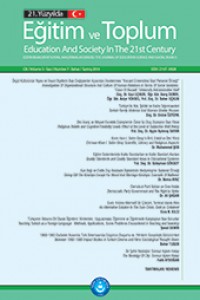Abstract
Türkiye’de, ekonomik, toplumsal ve siyasi açıdan birçok değişimin ve yeniliğin yaşandığı 1960 ve 1980 yılları arası, hem Türkiye hem de Türk Sineması açısından oldukça hareketli ve önemli bir dönem olmuştur.1960 ve 1980 darbeleri Türk halkını ekonomik ve sosyal yönden ağır biçimde etkilemiş, yaşanan sıkıntılar dönemin Türk Sineması’na da yansımıştır. Bu dönemde topluma ve toplumsal endişelere ayna tutan, Türk insanının sorunlarına eğilen filmler çekilmiştir. Kentleşme, sanayileşme, yabancılaşma, göç, gecekondu kültürünün ortaya çıkması, yoksulluk, işçi sorunu, sendikalaşma, bireyin ve ailenin kent içinde aldığı konum ve kentli orta sınıfın oluşum süreci gibi büyük toplumsal değişimler Türk Sineması’nda kendini tüm boyutuyla hissettirmiştir. Türk Sinema tarihi içerisinde 1960–1980 yılları arasındaki dönem, Türk Sineması’nın kendine özgü bir kimlik oluşturduğu dönem olarak ele alınmıştır. Bu çalışmada, 1960-1980 yılları arasında Türkiye’de yaşanan ekonomik, siyasi ve sosyal sorunları en iyi biçimde yansıtan ve o dönemde Türk Sineması’nda yeni yeni belirginleşen düşünce oluşumlarını en iyi şekilde ortaya koyan filmler arasından seçilen Halit Refiğ’in filmi Gurbet Kuşları, Yücel Çakmaklı’nın filmi Birleşen Yollar ve Yılmaz Güney’in filmi Umut, temel sosyolojik kavramlar açısından incelenerek analiz edilmiştir
References
- Adiloğlu, Fatoş, “Sinemada Mimari Açılımlar: Halit Refiğ Filmleri”, Es Yayınları, İstanbul, 2005.
- Berktay, Fatmagül, “Tek Tanrılı Dinler Karşısında Kadın, Metis Yay., İstanbul, 2000.
- Daldal, Aslı, “1960 Darbesi ve Türk Sinemasında Toplumsal Gerçekçilik”, Homer Kitapevi, 1.Ba- sım, İstanbul, 2005.
- Esen, Şükran, “80’ler Türkiyesi’nde Sinema”, 2. Basım, Beta Basım, İstanbul, 2000.
- Güney, Yılmaz, “Siyasal Yazılar”, Güney Yayınları, İstanbul, 2000.
- Kaplan, Neşe, “Aile Sineması Yılları 1960‟lar”, Es Yay., İstanbul, 2004.
- Kırel, Serpil, “Yeşilçam Öykü Sineması”, Babil Yayınları, İstanbul, 2005.
- Kongar, Emre, “21. Yüzyılda Türkiye”, 26. Basım, Remzi Kitabevi, İstanbul, 2000.
- Makal, Oğuz, “Sinemada Yedinci Adam”, Ege Yayınları, 2.Basım, İzmir, 1994.
- Onaran, A. Şerif, “Türk Sineması”, C.1, 2. Basım, Kitle Yayınları, İstanbul, 1999.
- Özön, Nijat, “Karagözden Sinemaya Türk Sineması ve Sorunları”, C.1, Kitle Yayınları, Ankara, 1995.
- Özön, Nijat, “Türk Sineması”, Cumhuriyet Dönemi Türkiye Ansiklopedisi, C.7, İletişim Yayınları, İstanbul, 1983.
- Refiğ, Halit, “Ulusal Sinema Kavgası”, Hareket Yayınları, İstanbul, 1971.
- Sencer, Yakut, “Türkiye’de Kentleşme”, Kültür Bakanlığı Yay., 1.Basım, 1979.
- Scognamillo, Giovanni, “Türk Sinema Tarihi 1960-1986”, C.2, Metis Yayınları, İstanbul, 1988.
- Türkdoğan, Orhan, “Yoksulluk Kültürü”, Dede Korkut Yay., 2.Baskı, Mayıs 1977.
- Uçakan, Mesut, “Türk Sinemasında İdeoloji”, Düşünce Yayınları, İstanbul, 1977.
Abstract
The period between 1960 and 1980 has been a very significant and restless both
for Turkey and for the Turkish cinema, at which there were a lot of changes and
innovations in economic, social and political atmospheres locally. The 1960’s and
1980’s coups deeply impacted the economic and social life in Turkey and the indications of the nuisances of this era has been reflected in the Turkish cinema. In
this era, there were movies which mirrored the worries of society and reflecting the
problems of Turkish people. The great social changes like urbanization, alienation,
immigration, the revealing of the shanty town culture, poverty, the problems of
proletarians, unionization, the replacement of the individual and family in the urban life and the formation of middle class were all felt in Turkish cinema by all means. In the history of Turkish cinema, the period between 1960 and 1980 was considered as a period that Turkish cinema created a unique identity by its own. In this
study, the movie Gurbet Kuşları by Halit Refiğ, Birleşen Yollar by Yücel Çakmaklı
and Umut by Yılmaz Güney have been selected to be one of the best reflectors of the
economic, political and social problems of the period 1960-1980, besides they were
selected because they can be considered as frontrunners of the new styles for the
Turkish Cinema for that time which were newly flourished and these are analyzed
by considering the fundamental sociological concepts.
References
- Adiloğlu, Fatoş, “Sinemada Mimari Açılımlar: Halit Refiğ Filmleri”, Es Yayınları, İstanbul, 2005.
- Berktay, Fatmagül, “Tek Tanrılı Dinler Karşısında Kadın, Metis Yay., İstanbul, 2000.
- Daldal, Aslı, “1960 Darbesi ve Türk Sinemasında Toplumsal Gerçekçilik”, Homer Kitapevi, 1.Ba- sım, İstanbul, 2005.
- Esen, Şükran, “80’ler Türkiyesi’nde Sinema”, 2. Basım, Beta Basım, İstanbul, 2000.
- Güney, Yılmaz, “Siyasal Yazılar”, Güney Yayınları, İstanbul, 2000.
- Kaplan, Neşe, “Aile Sineması Yılları 1960‟lar”, Es Yay., İstanbul, 2004.
- Kırel, Serpil, “Yeşilçam Öykü Sineması”, Babil Yayınları, İstanbul, 2005.
- Kongar, Emre, “21. Yüzyılda Türkiye”, 26. Basım, Remzi Kitabevi, İstanbul, 2000.
- Makal, Oğuz, “Sinemada Yedinci Adam”, Ege Yayınları, 2.Basım, İzmir, 1994.
- Onaran, A. Şerif, “Türk Sineması”, C.1, 2. Basım, Kitle Yayınları, İstanbul, 1999.
- Özön, Nijat, “Karagözden Sinemaya Türk Sineması ve Sorunları”, C.1, Kitle Yayınları, Ankara, 1995.
- Özön, Nijat, “Türk Sineması”, Cumhuriyet Dönemi Türkiye Ansiklopedisi, C.7, İletişim Yayınları, İstanbul, 1983.
- Refiğ, Halit, “Ulusal Sinema Kavgası”, Hareket Yayınları, İstanbul, 1971.
- Sencer, Yakut, “Türkiye’de Kentleşme”, Kültür Bakanlığı Yay., 1.Basım, 1979.
- Scognamillo, Giovanni, “Türk Sinema Tarihi 1960-1986”, C.2, Metis Yayınları, İstanbul, 1988.
- Türkdoğan, Orhan, “Yoksulluk Kültürü”, Dede Korkut Yay., 2.Baskı, Mayıs 1977.
- Uçakan, Mesut, “Türk Sinemasında İdeoloji”, Düşünce Yayınları, İstanbul, 1977.
Details
| Primary Language | Turkish |
|---|---|
| Journal Section | Eğitim ve Toplum Sayı 7 |
| Authors | |
| Publication Date | August 14, 2014 |
| Submission Date | April 9, 2015 |
| Published in Issue | Year 2014 Volume: 3 Issue: 7 |
It publishes articles in Turkish in the fields of Educational Sciences and Social Sciences. The journal reaches libraries in Türkiye and abroad in printed form, and its electronic copy is scanned by many indexes.


